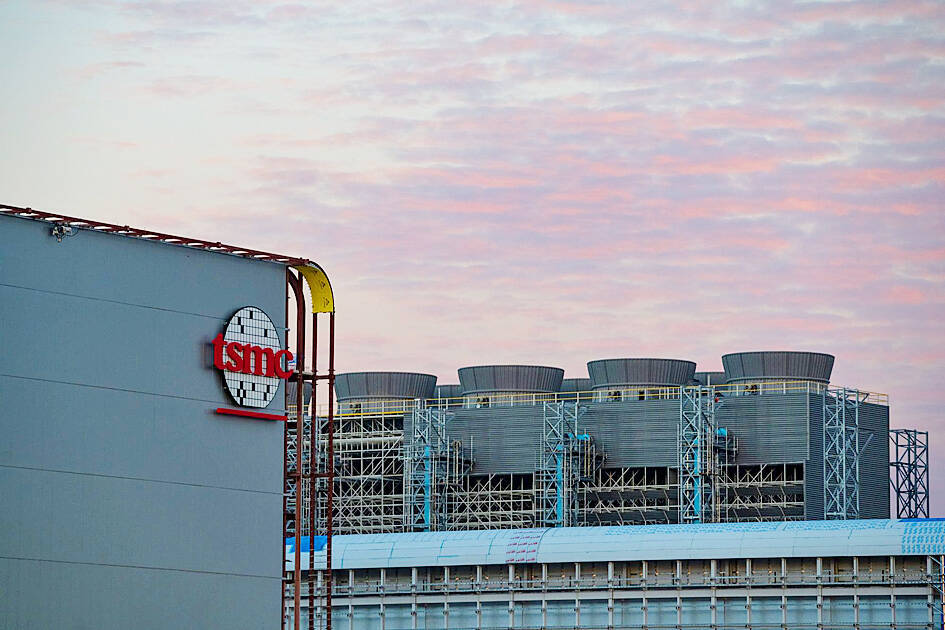Taiwan Semiconductor Manufacturing Co (TSMC, 台積電) has announced that its Arizona subsidiary will expand its apprenticeship program to include more aspects of the manufacturing process.
Originally opening apprenticeships for facilities technicians, TSMC Arizona will begin recruiting trainee equipment technicians, process technicians and manufacturing technician specialists, according to the world’s largest contract chip maker.
By next year, a total of 130 full-time registered apprentices are expected to participate in TSMC Arizona’s Registered Technician Apprenticeship program, in addition to the eight facilities technician apprentices who joined in April this year, TSMC said.

Photo: Bloomberg
Under the program, described as “the first of its kind in Arizona” by local media, 80 apprentices were originally to be trained over five years.
The training program is expected to be completed in about 18 to 24 months for each apprentice after which they can decide whether or not to continue pursuing a career in TSMC Arizona, the company said.
TSMC Arizona is investing more than US$5 million in the programs, including on-the-job training hours and tuition support for the apprentice employees.
TSMC Arizona president Rose Castanares said that the apprentices will have the chance to obtain certifications or technician credentials, as well as an optional associate degree, according to a news report by the Arizona Commerce Authority.
The Arizona Commerce Authority is an economic development organization overseen by public-private sector board of directors.
“One of the top considerations in TSMC’s decision to expand here was the opportunity to tap a local and diverse talent pipeline and collaborate with a world-class US education system,” Castanares was quoted as saying.

Vincent Wei led fellow Singaporean farmers around an empty Malaysian plot, laying out plans for a greenhouse and rows of leafy vegetables. What he pitched was not just space for crops, but a lifeline for growers struggling to make ends meet in a city-state with high prices and little vacant land. The future agriculture hub is part of a joint special economic zone launched last year by the two neighbors, expected to cost US$123 million and produce 10,000 tonnes of fresh produce annually. It is attracting Singaporean farmers with promises of cheaper land, labor and energy just over the border.

US actor Matthew McConaughey has filed recordings of his image and voice with US patent authorities to protect them from unauthorized usage by artificial intelligence (AI) platforms, a representative said earlier this week. Several video clips and audio recordings were registered by the commercial arm of the Just Keep Livin’ Foundation, a non-profit created by the Oscar-winning actor and his wife, Camila, according to the US Patent and Trademark Office database. Many artists are increasingly concerned about the uncontrolled use of their image via generative AI since the rollout of ChatGPT and other AI-powered tools. Several US states have adopted

A proposed billionaires’ tax in California has ignited a political uproar in Silicon Valley, with tech titans threatening to leave the state while California Governor Gavin Newsom of the Democratic Party maneuvers to defeat a levy that he fears would lead to an exodus of wealth. A technology mecca, California has more billionaires than any other US state — a few hundred, by some estimates. About half its personal income tax revenue, a financial backbone in the nearly US$350 billion budget, comes from the top 1 percent of earners. A large healthcare union is attempting to place a proposal before

KEEPING UP: The acquisition of a cleanroom in Taiwan would enable Micron to increase production in a market where demand continues to outpace supply, a Micron official said Micron Technology Inc has signed a letter of intent to buy a fabrication site in Taiwan from Powerchip Semiconductor Manufacturing Corp (力積電) for US$1.8 billion to expand its production of memory chips. Micron would take control of the P5 site in Miaoli County’s Tongluo Township (銅鑼) and plans to ramp up DRAM production in phases after the transaction closes in the second quarter, the company said in a statement on Saturday. The acquisition includes an existing 12 inch fab cleanroom of 27,871m2 and would further position Micron to address growing global demand for memory solutions, the company said. Micron expects the transaction to